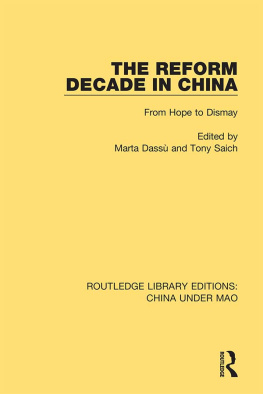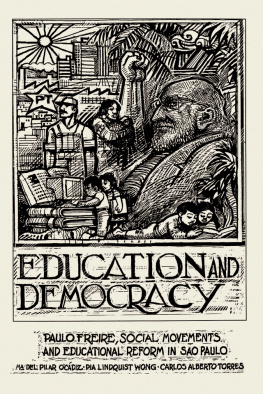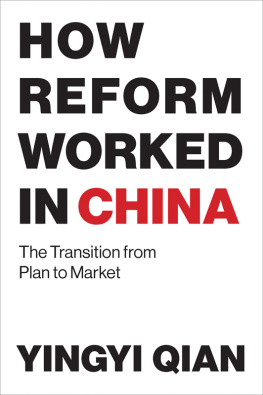First published 1993 by Westview Press, Inc.
Published 2018 by Routledge
52 Vanderbilt Avenue, New York, NY 10017
2 Park Square, Milton Park, Abingdon, Oxon OX14 4RN
Routledge is an imprint of the Taylor & Francis Group, an informa business
Copyright 1993 Taylor & Francis
All rights reserved. No part of this book may be reprinted or reproduced or utilised in any form or by any electronic, mechanical, or other means, now known or hereafter invented, including photocopying and recording, or in any information storage or retrieval system, without permission in writing from the publishers.
Notice:
Product or corporate names may be trademarks or registered trademarks, and are used only for identification and explanation without intent to infringe.
Library of Congress Cataloging-in-Publication Data
Democracy in the Russian school: The reform movement in education
since 1984/edited b Ben Eklof and Edward Dneprov.
p. cm.
Includes index.
ISBN 0-8133-1349-X
1. EducationRussian S.F.S.R.History20th century.
2. Educational changeRussian S.R.S.R.History20th century.
I. Eklof, Ben, 1946- . II. Dneprov, E.D.
LA583.R88D46 1993
370'.947dc20 92-5888
CIP
ISBN 13: 978-0-367-00436-1 (hbk)
1
Democracy in the Russian School: Educational Reform Since 1984
Amidst the turmoil and excitement of events of recent years in the former Soviet Union, changes in education have, perhaps understandably, attracted little attention in the West. As important as education is, most would consider it an issue for the "day after," once more pressing issues of economic and political stabilization have been resolved. Lenin once remarked caustically of the liberal enthusiasts in the Committee for Literacy in St. Petersburg at the turn of the century: "If they think they can change the world, let them try!" Lenin's skepticism about the capacity of schools to affect social change, and cynicism about those who try, has a modern ring, more so than the ameliorationist, Enlightenment-driven views of nineteenth-century Russian reformers, who believed that schools could be used to dispel the darkness of popular ignorance, to promote science and a modern cast of mind-to transform society. Today, schools seem mired in the woes of society, incapable of holding up against powerful currents increasingly marginalizing formal education, or subverted by poverty, crime, declining attention to the printed word, and the seeming irrelevance of the curriculum. Schools do a better job of replicating society than of changing it.
Yet today in the Russian Federation a team of militant reformers has come to power in the restructured Ministry of Education. They are determined not only to redesign the school system, but also to use the new schools to create a different society, one peopled by individuals capable of taking initiative and responsibility and of building a participatory democracy.
The Minister of Education, Edward D. Dneprov, is an historian by training, steeped in the issues, perspectives, and even rhetoric of the period of Russia's Great Reforms during the 1860s, but also a shestidesiatnik (or "man of the sixties") in that he came to political maturity in the era of the Twentieth Party the pre-revolutionary and early Soviet progressive education tradition, and diverse Western currents which have long influenced Russian pedagogy.
It is the task of this brief introduction to outline the history of the current reform movement in Russian education, to summarize its program, and to comment briefly upon the current status of the schools in the context of the current situation in Russia as a whole.
I am not a fully detached observer of these events. Trained as a social historian, I first met Dneprov in the archives, and a close professional and personal relationship developed around our mutual interest in the history of Russian education. In the summer of 1989 Dneprov attended a conference held in Philadelphia on the Great Reforms in Russian History; by then it had become obvious that his energies were elsewhere. As his prominence rose in the reform movement, so my own attention was diverted to current concerns in education, at least partially to understand why my colleague had become a public figure, what his program was and what its prospects for success were, and last, but not least of all, what perspective his training as a historian of pre-revolutionary Russia had contributed to his current activities. I admire and respect Dneprov and the team which came together under VNIK. This does not mean that I do not have an independent perspective, or that I am entirely unskeptical of certain components of the program or elements of the ideology. Yet it would be dishonest to conceal the personal connection that exists.
Moreover, having received my training as a social historian, I have developed a profound wariness of what Marx called the "illusion of politics," i.e., the belief that changes in society flow from the pens of legislators, or that there is any direct relationship between the beliefs and programs of politicians and what actually happens in schools. Instead, I see schools as arenas of "contestation," in which the diverse agendas of children, parents, teachers, administrators and the community at large are negotiated and the outcomes are unpredictable. I am ill at ease looking at schools "top down," but this is exactly what this volume is about. The reader is cautioned that I know more about what is happening in the corridors of the ministry than in the corridors of the schoolroom, where indeed the situation today seems to be remarkably diverse, volatile andperhaps more than at any other time in the twentieth centuryquite independent of ministerial control. There is no question in my mind that the "pedagogy of cooperation" and the VNIK program are eminently worthy of attention; for here many of the rich strands making up obshchestvennost' , or public consciousness in Russia today, can be studied, and the often contradictory relationship between these strands investigated. I am also certain that there is no way to fully understand Russian education today without reading the documents emanating from the ministry. The massive survey research conducted by VNIK and the formerly secret materials now released by the ministry provide us with extremely valuable information on conditions in the schools as well as on attitudes of key actors (pupils, parents, teachers). Nevertheless, this is primarily a study of the prescriptive rather than the descriptive ; let the reader be forewarned.








